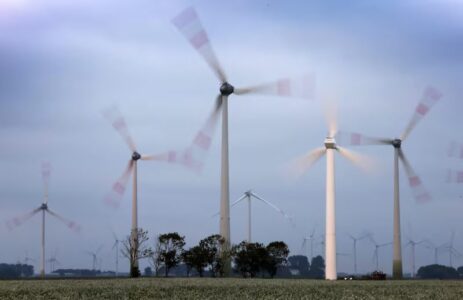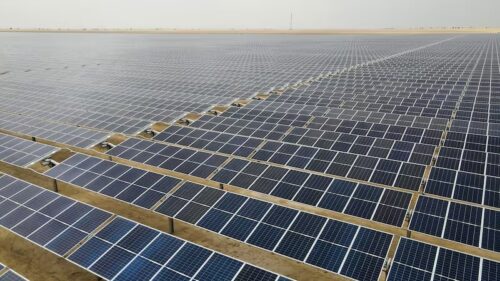Global investment in renewable energy must more than triple in the next six years to meet the 11,000-gigawatt capacity target by 2030 needed to keep 1.5°C within reach, Dr Sultan Al Jaber, Minister of Industry and Advanced Technology, and Cop28 President, said on Tuesday.
Tripling renewable energy capacity by 2030 was one of the key outcomes of the UAE Consensus, adopted at Cop28, with the aim of advancing global climate goals and promoting sustainable development.
“Tripling renewable capacity is not just a benchmark, it is an essential enabler of all global efforts to keep 1.5°C within reach, advance sustainable prosperity and leave no one behind,” Dr Al Jaber told the Global Renewables Summit, held on the sidelines of the 79th UN General Assembly in New York City.
While renewable energy has expanded eightfold in two decades and costs have plummeted more than 80 per cent, the pace of change is still not adequate, Dr Al Jaber said.
“The average levellised cost of solar power just reached a new low of 4 cents per kilowatt hour, basically cheaper than any other form of energy available today … the trends are moving in the right direction, they just aren’t moving fast enough,” he said.

The UAE Cop28 presidency has a signed a partnership with the hosts of the next two climate conferences, Azerbaijan and Brazil, to help keep the crucial climate goal of a global average rise in temperature of no more than 1.5ºC above pre-industrial levels within reach.
The Cop presidencies troika aims to boost co-operation and ensure continuity between the hosts of the annual climate talks in what is being called “mission 1.5ºC”.
Dr Al Jaber called for major investment in grid infrastructure, artificial intelligence and the Global South, while urging governments to include renewable targets in climate plans and incentivise private-sector investment.
While tapping into the private sector is critical, “investors need to know that their projects will have a viable grid to plug into, in a viable timeline”, said Dr Al Jaber. Grid infrastructure in many industrialised countries is more than 60 years old, while in many parts of the Global South there are no grids at all.
Grid investment must increase to $820 billion annually by 2030, doubling current levels to support the growth of renewable energy, the International Energy Agency has reported.
Meanwhile, governments “must step up” and include specific renewable energy and infrastructure targets in their next Nationally Determined Contributions (NDCs), Dr Al Jaber said. NDCs are climate action plans that individual countries develop and submit to outline their commitments to reduce greenhouse gas emissions and adapt to climate impacts.

“In too many places, the pace of permitting is like driving with the handbrake on, when we need to be accelerating down the highway,” Dr Al Jaber said.
The official also called for more inclusive growth. About 120 developing countries currently attract less than 15 per cent of global renewable energy investment, Dr Al Jaber said. He called on international financial institutions to make funding more widely available, accessible and affordable, and for private finance to be incentivised through blended models.
Alterra, the UAE’s $30 billion climate fund launched during Cop28, aims to raise $250 billion globally in the next six years to create a fairer climate finance system. It has already deployed $6.5 billion with investors in projects with a combined portfolio of 40 gigawatts.
On Monday, Texas-based TPG announced it had secured $1.3 billion in initial commitments for its Global South Initiative (GSI), aimed at attracting large-scale institutional capital by offering better returns to boost private equity investment in “high-growth climate opportunities”.
TPG and Alterra launched GSI at Cop28, targeting $2.5 billion in total capital commitment.
“There is much more to do to fill the power development gap in the Global South … and I would encourage all parties to explore all solutions in collaboration with like-minded partners,” Dr Al Jaber said.
Declaring that “business as usual simply will not work”, he called for a “new model of engagement that drives public and private partnership to a new level”.
Technology will also play a key role to support the sector. AI and other advanced technology can help overcome key challenges in renewable energy, such as intermittency and storage, by making grids smarter and optimising energy usage, Dr Al Jaber told the summit.
Predictive maintenance powered by AI could extend battery life, improve transmission infrastructure and enhance storage capacity.
However, widespread adoption of such technology in the energy sector is still in its early stages, particularly in regions where infrastructure remains underdeveloped. “The faster we invest in and apply AI to the energy sector, the faster its benefits can be scaled,” he said.
EU Commission President Ursula von der Leyen met Dr Al Jaber and thanked him for hosting Cop28 and said they discussed ways to deepen EU-UAE ties.
Once again, I thanked Dr Sultan Al Jaber for hosting @COP28_UAE and leading it towards major achievements.
Let’s keep the COP28 spirit alive.
We also discussed the EU-UAE longstanding partnership – and how to deepen it. pic.twitter.com/7FwmenxfMc
— Ursula von der Leyen (@vonderleyen) September 24, 2024



